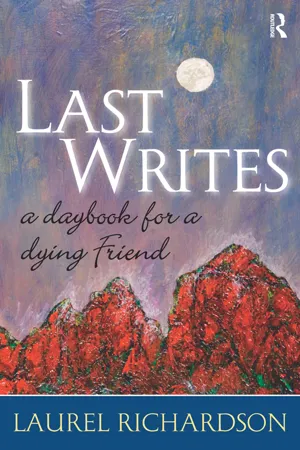Wednesday, February 1
“This horrible hospital,” Betty complains. She has an edginess to her voice I haven’t heard for a while.
“Penny,” she calls out, “Get me a hamburger with onions, and no French fries.”
“May I talk to Penny?” I ask.
“Sure…. Pen, it’s Laurel.”
Penny and I talk a bit about this and that, and then I say, “Penny, this might not be the best time to raise this, but if your mom should … ah … pass over while I am in Australia, would you be willing to have the memorial service after I return?” I have practiced this question for weeks, and I am relieved to have asked it.
“How long will you be in Australia?” Penny asks.
“Six weeks.”
Penny talks of this and that and then says, “Good talkin’ to you, Laurel.”
‘“You haven’t answered my question,” I say, surprised at my forthrightness.
“All right, Laurel,” says Penny, without much enthusiasm. “Here’s Mom again.”
“I’ll be back soon, Mom,” I hear Penny say.
“Poor Penny,” Betty says to me.
“How’s your pain?” I ask.
“Terrible. The doctor ordered one of those pain patches four hours ago and it’s still not here.”
“How’s your apartment?”
“Everything’s topsy-turvy. Mike wants to do everything for me. It ain’t gonna work that way. Things haven’t found their places yet. Still need a toilet paper holder. My kitchen doesn’t have a grater. I’m like my grandma scraping carrots with a knife.”
“I like doing that,” I say. “I like roughing up the carrot, the coarse texture against my hand, the smell.”
The next time someone asks me how come I’ve stayed friends with Betty, I’ll tell them because both our grandmothers made chicken soup with de-strung celery, peeled onions, and knife-scraped carrots.
Thursday, February 2
Ten a.m. and Betty’s back in her apartment, in pain, waiting for her pain pads. Penny’s been waiting at the drugstore for two hours, only to learn that the drugstore doesn’t stock them. Mike will try another store while Betty waits for a doctor’s phone call.
“I’ll catch you later today,” I say.
Seven p.m. and my day and dinner finished, I call Betty. “You sound good,” I say, responding to her deep pitched “Hello.”
“That’s the funniest thing I’ve heard all day,” she says.
“What’s so funny?”
“I feel awful. I am in so much pain. I’ve been in bed all day.”
“Pulled muscles hurt.”
“Penny thinks maybe it’s something else. I’ve been on a muscle relaxant and it hasn’t helped at all.” Betty starts coughing uncontrollably. “Ouch. Cough. Ouch. Cough. Ouch!”
Hearing her screams, my eyes tear, the way they did when my children cried in pain.
“Can you take cough suppressants?” Here I am again, trying to fix the problem.
“No,” she says angrily. “I’m not supposed to take muscle relaxants either.” Why then has your doctor prescribed them?
“Every time I cough … this is too much … ouch … the pain is right on my spine.”
“Why can’t you take muscle relaxants?” Maybe I’m trying to escape her cries of pain through rational conversation.
“Oh, what do I know!” she says.
“I am so sorry.” I say this so often. What else is there to say?
“Penny thinks it’s something else, not muscles,” Betty says.
“Maybe sciatica,” I suggest. I do not say maybe it’s cancer or maybe bones are fracturing when she coughs.
“Penny thinks it is not good for me to be in my bedroom all day, so she and Mike have turned my apartment upside down. They’ve brought my hospital bed into the living room so I can watch TV. I sleep in the living room now.”
“That’s different.”
“Penny thinks this pain is not enough to matter. She doesn’t understand.”
Penny thinks, Penny says, Penny this, Penny that. Is Penny her Mommy?
“How did Penny get her name?” I ask, surprised that I don’t know.
“Well, it had to be a P name after my mother.”
Why? I wonder. Betty detested her mother.
“What I did to Penny is what my mother did to me,” Betty continues. “I gave her a nickname.”
Betty didn’t quite do what her mother did, though. New Jersey law required that a child be named before it could leave the hospital. “What’s your name?” Betty’s mother asked the discharge nurse. “Betty,” the nurse said. “That’ll do,” said her mother.
“Well, Ms. Bet, have you figured out how to avoid hospitals forevermore?” I’ve wanted to ask her this question for weeks now.
“I’ve been studying up on that for years,” she says.
“Do you have pills?”
“Yes.”
“Doctors can’t make people take their pain pills or prevent them from getting more and stashing them,” I say, supporting her.
“I need to have this conversation.”
“With me?”
“No, not with you. With Penny…. Pam’s in town and wants to visit,” Betty says. “I told her not to.”
“Why?”
“I’ve always told you if I can hold onto my dignity and sense of humor, that’s enough. Wearing diapers, lying on a hospital bed in the middle of the living room—it’s not funny, and where’s the dignity?”
Friday, February 3
“This always happens.” Betty sounds annoyed.
“What?”
“You always call when I’m just off the phone.”
I’m confused. “You are off the phone, aren’t you?”
“Nobody calls all day and then everybody calls at once,” she says.
“Is Pam coming to see you tomorrow?”
“She’s not going to see me.”
“Maybe you could put on a nice robe.”
“She can’t see me!” Betty’s anger is rising. “I have to let her come out here, though.”
“Why?”
“She’s bringing things I need from Kent.”
“Who’s that in my house?” Betty shouts.
I hear a male voice.
“Is that you Jack?” she asks. “Can’t you knock?”
“How do you want your sausage cooked?” I hear Jack ask.
“Let Mike surprise me.”
“How do you want it cooked?” Jack repeats. He must have orders to get Grandma’s order right.
“Surprise me,” she repeats.
“I thought you’d have eaten by now,” I say. It’s 7:30.
“Yeah, that’s what I would have thought. Can I call you back later?”
“Sure. Whenever.”
The evening passes and Betty does not call back. Ernest and I watch Survivor and Without a Trace on our TiVo, and I straighten up my desk yet again. I am totally exhausted even though I have napped twice today. I look at my list of things to do before I go to Australia. On the list is sending my essay “Jeopardy” to Qualitative Inquiry. I spend a few minutes writing an abstract, cover letter, and title page. “Jeopardy” has been in my file cabinet for eight years.
Saturday, February 4
I reread “Jeopardy.” It chronicles the marriage of my son Josh to Rachel, the birth of their son, Akiva, and the breakup of their marriage. Rachel was forty-three at the time of the pregnancy, no medical tests, interventions, preventions, doctors, or hospitals were involved in the birthing or aftercare of Akiva. As his tie-dyed baby shirt attested, he was “Born at Home by CHOICE.” He had a tied tongue that the midwife cut with a knife. He was jaundiced and was placed on a sunny windowsill. His umbilical cord was put in the freezer to be buried in the spring.
Rachel believes in birth and death as “spiritual gateways.” The newborn, like the dying one, is fragile during the passage, susceptible to destructive energies. For Akiva’s first three months, she limits my visits. I worry that he will catch a terrible disease or never talk right or that he is genetically damaged. Rachel doesn’t believe in any vaccinations, including polio. At four months Akiva contracts whooping cough. At six months he’s exposed to a child who was given the live polio vaccine. I do not have the heart to fully love a grandchild I might lose. Only when his first birthday passes and he is still alive, walking, and talking, do I relax my fears.
It is very painful for me to revisit tha...

